University of Portsmouth International Accounting Harmonization Report
VerifiedAdded on 2022/10/15
|15
|3636
|102
Report
AI Summary
This report examines the harmonization of international accounting policies, focusing on the reduction of differences to promote uniformity and flexibility. It discusses the reasons for harmonization, including improved comparability, reduced costs for multinational companies, and enhanced access to foreign capital markets, while also addressing the issues that arise, such as socio-political differences, nationalism, and regulatory burdens. The report presents a case study of Burberry Group Plc., analyzing its adherence to UK GAAP and the implications of harmonization efforts. The study highlights the importance of accounting professionals in navigating IFRS adoption and emphasizes the need for consistent and high-quality accounting policies to ensure investor confidence and effective financial analysis. The report concludes with recommendations for further harmonization and improved financial reporting practices.
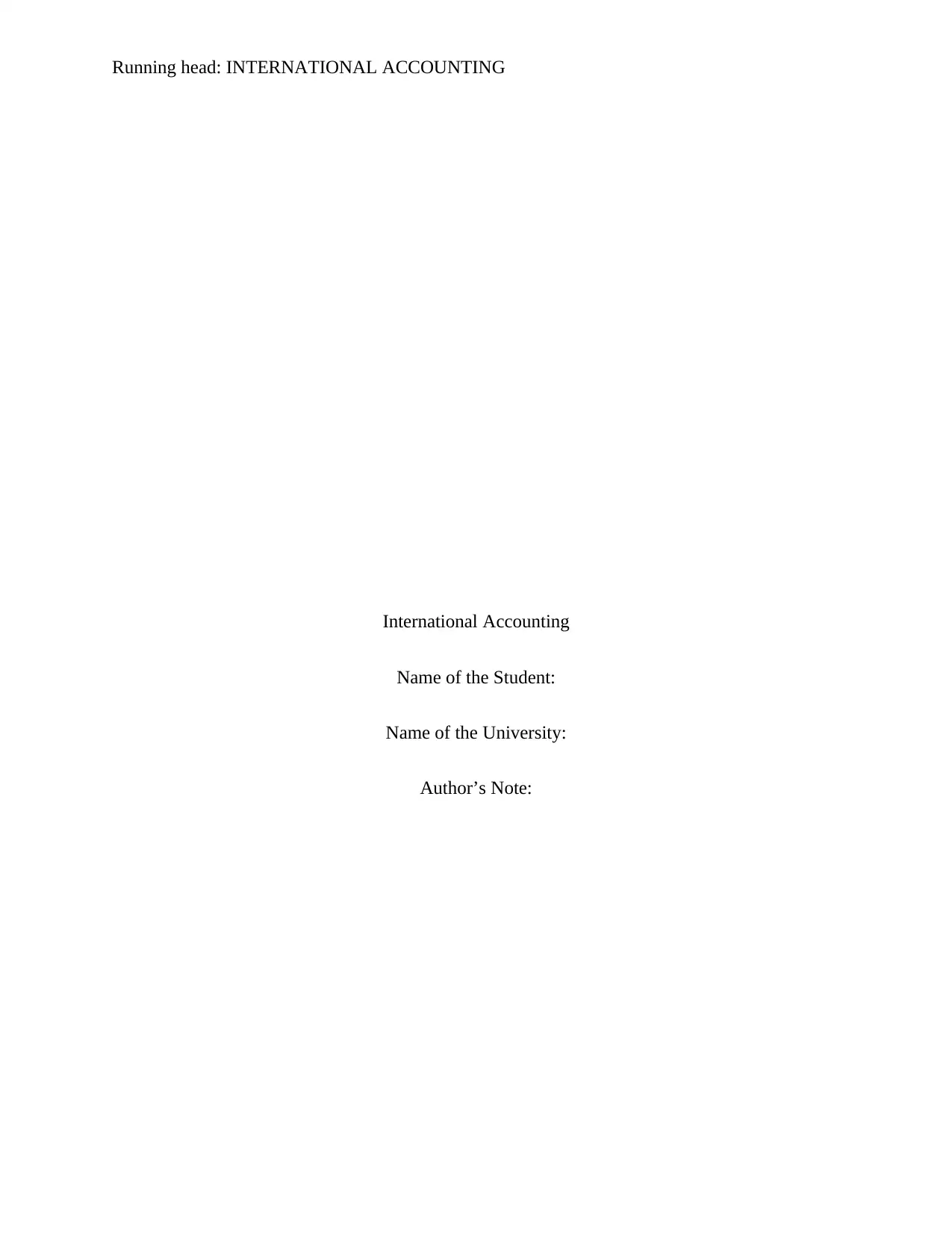
Running head: INTERNATIONAL ACCOUNTING
International Accounting
Name of the Student:
Name of the University:
Author’s Note:
International Accounting
Name of the Student:
Name of the University:
Author’s Note:
Paraphrase This Document
Need a fresh take? Get an instant paraphrase of this document with our AI Paraphraser
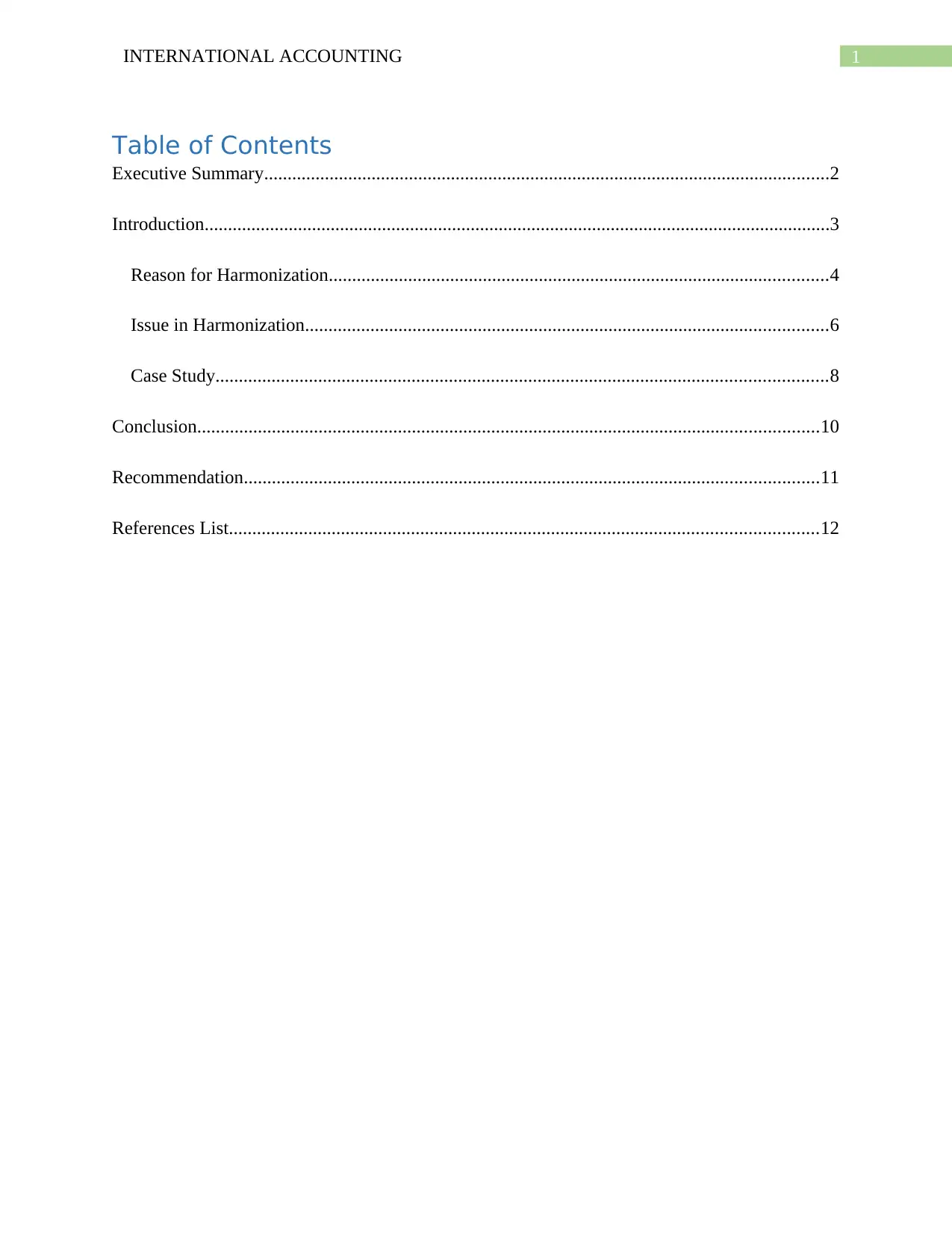
1INTERNATIONAL ACCOUNTING
Table of Contents
Executive Summary.........................................................................................................................2
Introduction......................................................................................................................................3
Reason for Harmonization...........................................................................................................4
Issue in Harmonization................................................................................................................6
Case Study...................................................................................................................................8
Conclusion.....................................................................................................................................10
Recommendation...........................................................................................................................11
References List..............................................................................................................................12
Table of Contents
Executive Summary.........................................................................................................................2
Introduction......................................................................................................................................3
Reason for Harmonization...........................................................................................................4
Issue in Harmonization................................................................................................................6
Case Study...................................................................................................................................8
Conclusion.....................................................................................................................................10
Recommendation...........................................................................................................................11
References List..............................................................................................................................12
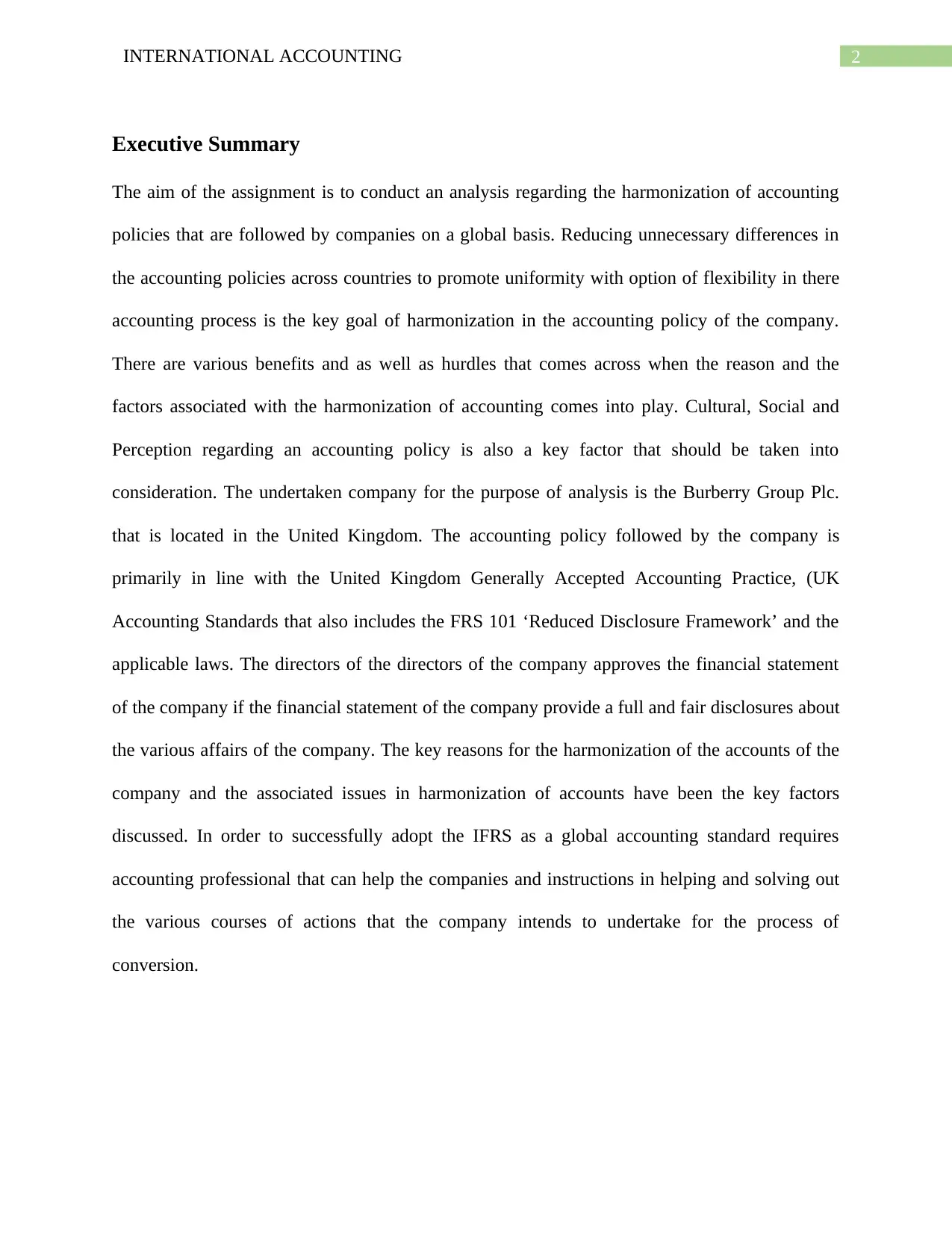
2INTERNATIONAL ACCOUNTING
Executive Summary
The aim of the assignment is to conduct an analysis regarding the harmonization of accounting
policies that are followed by companies on a global basis. Reducing unnecessary differences in
the accounting policies across countries to promote uniformity with option of flexibility in there
accounting process is the key goal of harmonization in the accounting policy of the company.
There are various benefits and as well as hurdles that comes across when the reason and the
factors associated with the harmonization of accounting comes into play. Cultural, Social and
Perception regarding an accounting policy is also a key factor that should be taken into
consideration. The undertaken company for the purpose of analysis is the Burberry Group Plc.
that is located in the United Kingdom. The accounting policy followed by the company is
primarily in line with the United Kingdom Generally Accepted Accounting Practice, (UK
Accounting Standards that also includes the FRS 101 ‘Reduced Disclosure Framework’ and the
applicable laws. The directors of the directors of the company approves the financial statement
of the company if the financial statement of the company provide a full and fair disclosures about
the various affairs of the company. The key reasons for the harmonization of the accounts of the
company and the associated issues in harmonization of accounts have been the key factors
discussed. In order to successfully adopt the IFRS as a global accounting standard requires
accounting professional that can help the companies and instructions in helping and solving out
the various courses of actions that the company intends to undertake for the process of
conversion.
Executive Summary
The aim of the assignment is to conduct an analysis regarding the harmonization of accounting
policies that are followed by companies on a global basis. Reducing unnecessary differences in
the accounting policies across countries to promote uniformity with option of flexibility in there
accounting process is the key goal of harmonization in the accounting policy of the company.
There are various benefits and as well as hurdles that comes across when the reason and the
factors associated with the harmonization of accounting comes into play. Cultural, Social and
Perception regarding an accounting policy is also a key factor that should be taken into
consideration. The undertaken company for the purpose of analysis is the Burberry Group Plc.
that is located in the United Kingdom. The accounting policy followed by the company is
primarily in line with the United Kingdom Generally Accepted Accounting Practice, (UK
Accounting Standards that also includes the FRS 101 ‘Reduced Disclosure Framework’ and the
applicable laws. The directors of the directors of the company approves the financial statement
of the company if the financial statement of the company provide a full and fair disclosures about
the various affairs of the company. The key reasons for the harmonization of the accounts of the
company and the associated issues in harmonization of accounts have been the key factors
discussed. In order to successfully adopt the IFRS as a global accounting standard requires
accounting professional that can help the companies and instructions in helping and solving out
the various courses of actions that the company intends to undertake for the process of
conversion.
⊘ This is a preview!⊘
Do you want full access?
Subscribe today to unlock all pages.

Trusted by 1+ million students worldwide
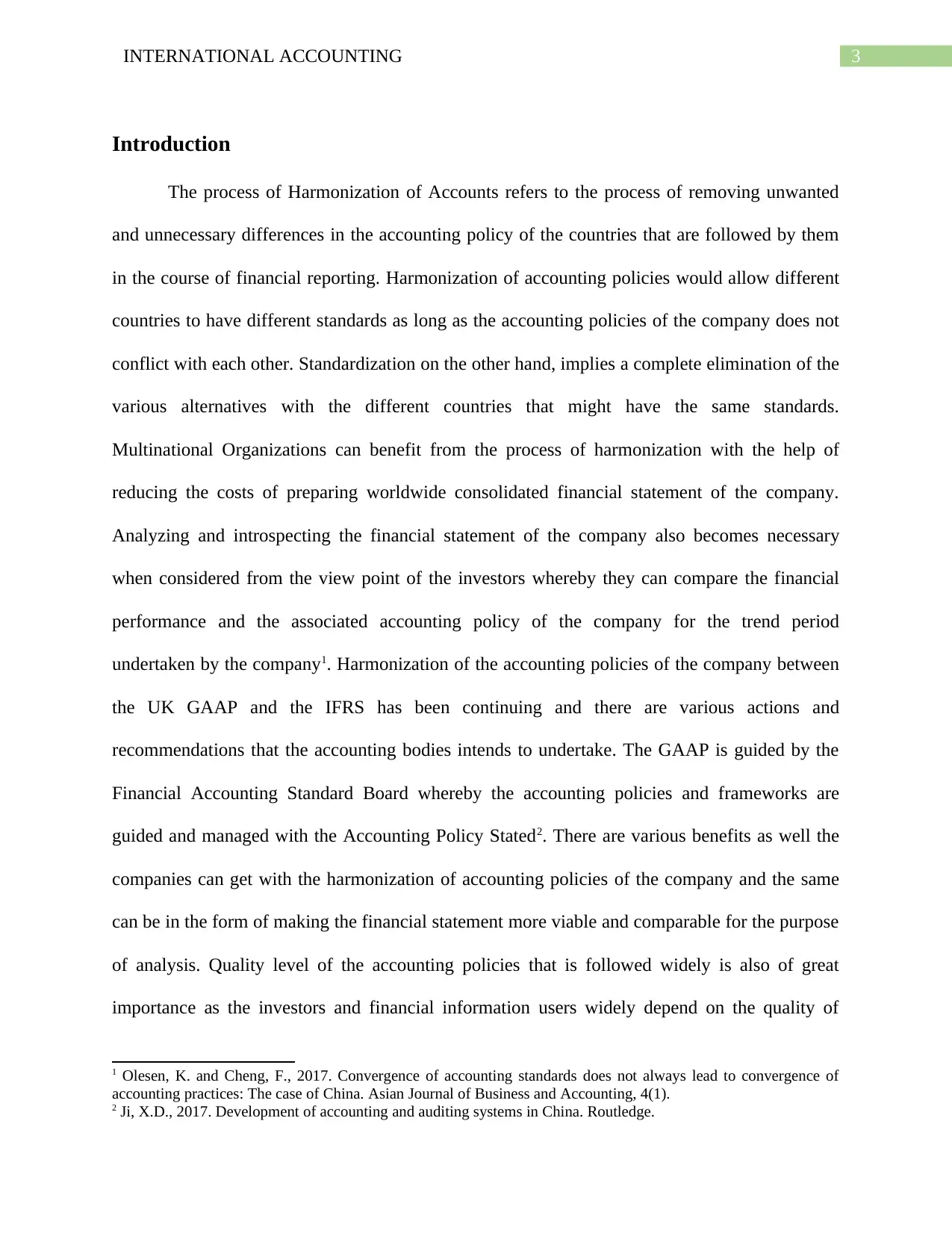
3INTERNATIONAL ACCOUNTING
Introduction
The process of Harmonization of Accounts refers to the process of removing unwanted
and unnecessary differences in the accounting policy of the countries that are followed by them
in the course of financial reporting. Harmonization of accounting policies would allow different
countries to have different standards as long as the accounting policies of the company does not
conflict with each other. Standardization on the other hand, implies a complete elimination of the
various alternatives with the different countries that might have the same standards.
Multinational Organizations can benefit from the process of harmonization with the help of
reducing the costs of preparing worldwide consolidated financial statement of the company.
Analyzing and introspecting the financial statement of the company also becomes necessary
when considered from the view point of the investors whereby they can compare the financial
performance and the associated accounting policy of the company for the trend period
undertaken by the company1. Harmonization of the accounting policies of the company between
the UK GAAP and the IFRS has been continuing and there are various actions and
recommendations that the accounting bodies intends to undertake. The GAAP is guided by the
Financial Accounting Standard Board whereby the accounting policies and frameworks are
guided and managed with the Accounting Policy Stated2. There are various benefits as well the
companies can get with the harmonization of accounting policies of the company and the same
can be in the form of making the financial statement more viable and comparable for the purpose
of analysis. Quality level of the accounting policies that is followed widely is also of great
importance as the investors and financial information users widely depend on the quality of
1 Olesen, K. and Cheng, F., 2017. Convergence of accounting standards does not always lead to convergence of
accounting practices: The case of China. Asian Journal of Business and Accounting, 4(1).
2 Ji, X.D., 2017. Development of accounting and auditing systems in China. Routledge.
Introduction
The process of Harmonization of Accounts refers to the process of removing unwanted
and unnecessary differences in the accounting policy of the countries that are followed by them
in the course of financial reporting. Harmonization of accounting policies would allow different
countries to have different standards as long as the accounting policies of the company does not
conflict with each other. Standardization on the other hand, implies a complete elimination of the
various alternatives with the different countries that might have the same standards.
Multinational Organizations can benefit from the process of harmonization with the help of
reducing the costs of preparing worldwide consolidated financial statement of the company.
Analyzing and introspecting the financial statement of the company also becomes necessary
when considered from the view point of the investors whereby they can compare the financial
performance and the associated accounting policy of the company for the trend period
undertaken by the company1. Harmonization of the accounting policies of the company between
the UK GAAP and the IFRS has been continuing and there are various actions and
recommendations that the accounting bodies intends to undertake. The GAAP is guided by the
Financial Accounting Standard Board whereby the accounting policies and frameworks are
guided and managed with the Accounting Policy Stated2. There are various benefits as well the
companies can get with the harmonization of accounting policies of the company and the same
can be in the form of making the financial statement more viable and comparable for the purpose
of analysis. Quality level of the accounting policies that is followed widely is also of great
importance as the investors and financial information users widely depend on the quality of
1 Olesen, K. and Cheng, F., 2017. Convergence of accounting standards does not always lead to convergence of
accounting practices: The case of China. Asian Journal of Business and Accounting, 4(1).
2 Ji, X.D., 2017. Development of accounting and auditing systems in China. Routledge.
Paraphrase This Document
Need a fresh take? Get an instant paraphrase of this document with our AI Paraphraser
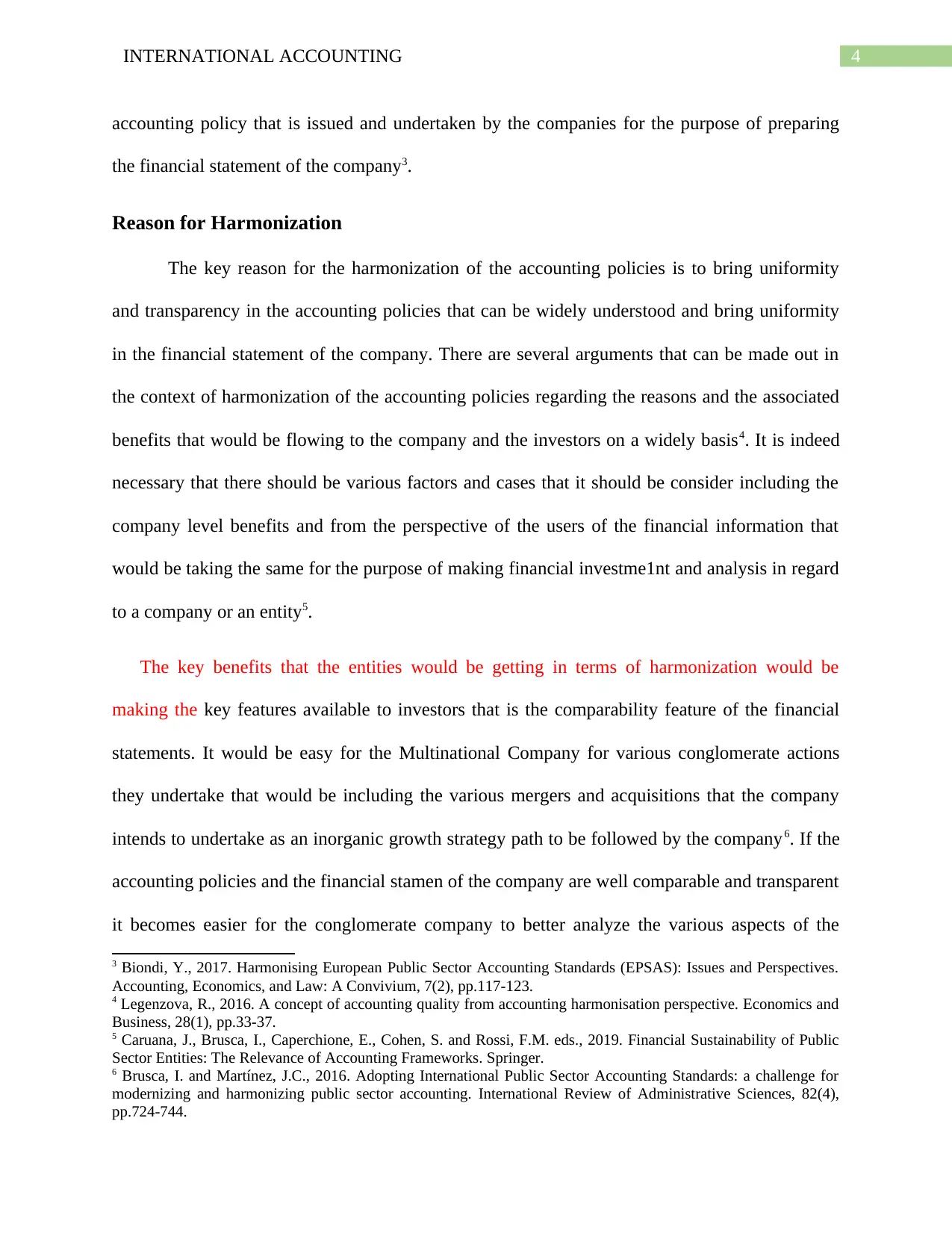
4INTERNATIONAL ACCOUNTING
accounting policy that is issued and undertaken by the companies for the purpose of preparing
the financial statement of the company3.
Reason for Harmonization
The key reason for the harmonization of the accounting policies is to bring uniformity
and transparency in the accounting policies that can be widely understood and bring uniformity
in the financial statement of the company. There are several arguments that can be made out in
the context of harmonization of the accounting policies regarding the reasons and the associated
benefits that would be flowing to the company and the investors on a widely basis4. It is indeed
necessary that there should be various factors and cases that it should be consider including the
company level benefits and from the perspective of the users of the financial information that
would be taking the same for the purpose of making financial investme1nt and analysis in regard
to a company or an entity5.
The key benefits that the entities would be getting in terms of harmonization would be
making the key features available to investors that is the comparability feature of the financial
statements. It would be easy for the Multinational Company for various conglomerate actions
they undertake that would be including the various mergers and acquisitions that the company
intends to undertake as an inorganic growth strategy path to be followed by the company6. If the
accounting policies and the financial stamen of the company are well comparable and transparent
it becomes easier for the conglomerate company to better analyze the various aspects of the
3 Biondi, Y., 2017. Harmonising European Public Sector Accounting Standards (EPSAS): Issues and Perspectives.
Accounting, Economics, and Law: A Convivium, 7(2), pp.117-123.
4 Legenzova, R., 2016. A concept of accounting quality from accounting harmonisation perspective. Economics and
Business, 28(1), pp.33-37.
5 Caruana, J., Brusca, I., Caperchione, E., Cohen, S. and Rossi, F.M. eds., 2019. Financial Sustainability of Public
Sector Entities: The Relevance of Accounting Frameworks. Springer.
6 Brusca, I. and Martínez, J.C., 2016. Adopting International Public Sector Accounting Standards: a challenge for
modernizing and harmonizing public sector accounting. International Review of Administrative Sciences, 82(4),
pp.724-744.
accounting policy that is issued and undertaken by the companies for the purpose of preparing
the financial statement of the company3.
Reason for Harmonization
The key reason for the harmonization of the accounting policies is to bring uniformity
and transparency in the accounting policies that can be widely understood and bring uniformity
in the financial statement of the company. There are several arguments that can be made out in
the context of harmonization of the accounting policies regarding the reasons and the associated
benefits that would be flowing to the company and the investors on a widely basis4. It is indeed
necessary that there should be various factors and cases that it should be consider including the
company level benefits and from the perspective of the users of the financial information that
would be taking the same for the purpose of making financial investme1nt and analysis in regard
to a company or an entity5.
The key benefits that the entities would be getting in terms of harmonization would be
making the key features available to investors that is the comparability feature of the financial
statements. It would be easy for the Multinational Company for various conglomerate actions
they undertake that would be including the various mergers and acquisitions that the company
intends to undertake as an inorganic growth strategy path to be followed by the company6. If the
accounting policies and the financial stamen of the company are well comparable and transparent
it becomes easier for the conglomerate company to better analyze the various aspects of the
3 Biondi, Y., 2017. Harmonising European Public Sector Accounting Standards (EPSAS): Issues and Perspectives.
Accounting, Economics, and Law: A Convivium, 7(2), pp.117-123.
4 Legenzova, R., 2016. A concept of accounting quality from accounting harmonisation perspective. Economics and
Business, 28(1), pp.33-37.
5 Caruana, J., Brusca, I., Caperchione, E., Cohen, S. and Rossi, F.M. eds., 2019. Financial Sustainability of Public
Sector Entities: The Relevance of Accounting Frameworks. Springer.
6 Brusca, I. and Martínez, J.C., 2016. Adopting International Public Sector Accounting Standards: a challenge for
modernizing and harmonizing public sector accounting. International Review of Administrative Sciences, 82(4),
pp.724-744.
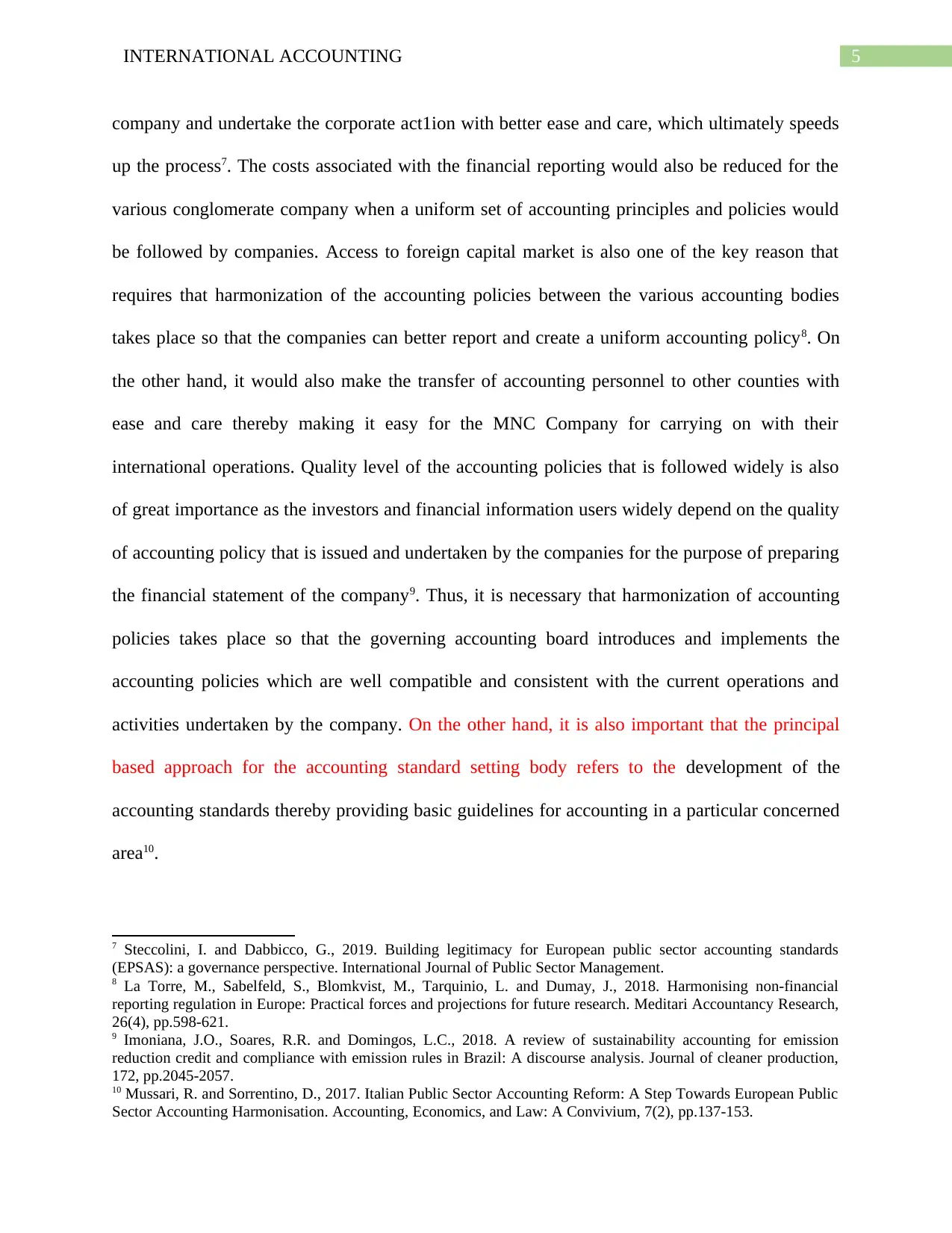
5INTERNATIONAL ACCOUNTING
company and undertake the corporate act1ion with better ease and care, which ultimately speeds
up the process7. The costs associated with the financial reporting would also be reduced for the
various conglomerate company when a uniform set of accounting principles and policies would
be followed by companies. Access to foreign capital market is also one of the key reason that
requires that harmonization of the accounting policies between the various accounting bodies
takes place so that the companies can better report and create a uniform accounting policy8. On
the other hand, it would also make the transfer of accounting personnel to other counties with
ease and care thereby making it easy for the MNC Company for carrying on with their
international operations. Quality level of the accounting policies that is followed widely is also
of great importance as the investors and financial information users widely depend on the quality
of accounting policy that is issued and undertaken by the companies for the purpose of preparing
the financial statement of the company9. Thus, it is necessary that harmonization of accounting
policies takes place so that the governing accounting board introduces and implements the
accounting policies which are well compatible and consistent with the current operations and
activities undertaken by the company. On the other hand, it is also important that the principal
based approach for the accounting standard setting body refers to the development of the
accounting standards thereby providing basic guidelines for accounting in a particular concerned
area10.
7 Steccolini, I. and Dabbicco, G., 2019. Building legitimacy for European public sector accounting standards
(EPSAS): a governance perspective. International Journal of Public Sector Management.
8 La Torre, M., Sabelfeld, S., Blomkvist, M., Tarquinio, L. and Dumay, J., 2018. Harmonising non-financial
reporting regulation in Europe: Practical forces and projections for future research. Meditari Accountancy Research,
26(4), pp.598-621.
9 Imoniana, J.O., Soares, R.R. and Domingos, L.C., 2018. A review of sustainability accounting for emission
reduction credit and compliance with emission rules in Brazil: A discourse analysis. Journal of cleaner production,
172, pp.2045-2057.
10 Mussari, R. and Sorrentino, D., 2017. Italian Public Sector Accounting Reform: A Step Towards European Public
Sector Accounting Harmonisation. Accounting, Economics, and Law: A Convivium, 7(2), pp.137-153.
company and undertake the corporate act1ion with better ease and care, which ultimately speeds
up the process7. The costs associated with the financial reporting would also be reduced for the
various conglomerate company when a uniform set of accounting principles and policies would
be followed by companies. Access to foreign capital market is also one of the key reason that
requires that harmonization of the accounting policies between the various accounting bodies
takes place so that the companies can better report and create a uniform accounting policy8. On
the other hand, it would also make the transfer of accounting personnel to other counties with
ease and care thereby making it easy for the MNC Company for carrying on with their
international operations. Quality level of the accounting policies that is followed widely is also
of great importance as the investors and financial information users widely depend on the quality
of accounting policy that is issued and undertaken by the companies for the purpose of preparing
the financial statement of the company9. Thus, it is necessary that harmonization of accounting
policies takes place so that the governing accounting board introduces and implements the
accounting policies which are well compatible and consistent with the current operations and
activities undertaken by the company. On the other hand, it is also important that the principal
based approach for the accounting standard setting body refers to the development of the
accounting standards thereby providing basic guidelines for accounting in a particular concerned
area10.
7 Steccolini, I. and Dabbicco, G., 2019. Building legitimacy for European public sector accounting standards
(EPSAS): a governance perspective. International Journal of Public Sector Management.
8 La Torre, M., Sabelfeld, S., Blomkvist, M., Tarquinio, L. and Dumay, J., 2018. Harmonising non-financial
reporting regulation in Europe: Practical forces and projections for future research. Meditari Accountancy Research,
26(4), pp.598-621.
9 Imoniana, J.O., Soares, R.R. and Domingos, L.C., 2018. A review of sustainability accounting for emission
reduction credit and compliance with emission rules in Brazil: A discourse analysis. Journal of cleaner production,
172, pp.2045-2057.
10 Mussari, R. and Sorrentino, D., 2017. Italian Public Sector Accounting Reform: A Step Towards European Public
Sector Accounting Harmonisation. Accounting, Economics, and Law: A Convivium, 7(2), pp.137-153.
⊘ This is a preview!⊘
Do you want full access?
Subscribe today to unlock all pages.

Trusted by 1+ million students worldwide
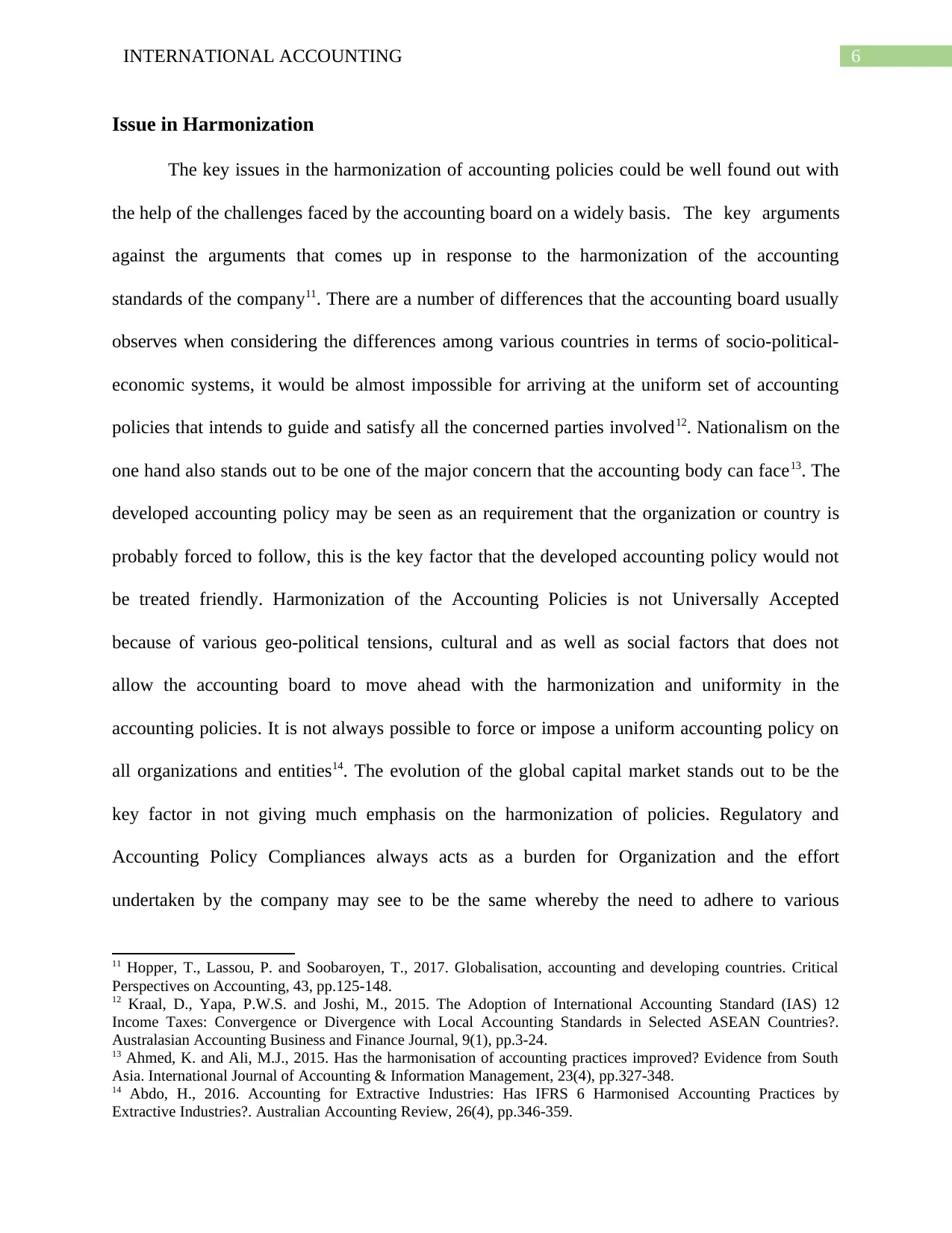
6INTERNATIONAL ACCOUNTING
Issue in Harmonization
The key issues in the harmonization of accounting policies could be well found out with
the help of the challenges faced by the accounting board on a widely basis. The key arguments
against the arguments that comes up in response to the harmonization of the accounting
standards of the company11. There are a number of differences that the accounting board usually
observes when considering the differences among various countries in terms of socio-political-
economic systems, it would be almost impossible for arriving at the uniform set of accounting
policies that intends to guide and satisfy all the concerned parties involved12. Nationalism on the
one hand also stands out to be one of the major concern that the accounting body can face13. The
developed accounting policy may be seen as an requirement that the organization or country is
probably forced to follow, this is the key factor that the developed accounting policy would not
be treated friendly. Harmonization of the Accounting Policies is not Universally Accepted
because of various geo-political tensions, cultural and as well as social factors that does not
allow the accounting board to move ahead with the harmonization and uniformity in the
accounting policies. It is not always possible to force or impose a uniform accounting policy on
all organizations and entities14. The evolution of the global capital market stands out to be the
key factor in not giving much emphasis on the harmonization of policies. Regulatory and
Accounting Policy Compliances always acts as a burden for Organization and the effort
undertaken by the company may see to be the same whereby the need to adhere to various
11 Hopper, T., Lassou, P. and Soobaroyen, T., 2017. Globalisation, accounting and developing countries. Critical
Perspectives on Accounting, 43, pp.125-148.
12 Kraal, D., Yapa, P.W.S. and Joshi, M., 2015. The Adoption of International Accounting Standard (IAS) 12
Income Taxes: Convergence or Divergence with Local Accounting Standards in Selected ASEAN Countries?.
Australasian Accounting Business and Finance Journal, 9(1), pp.3-24.
13 Ahmed, K. and Ali, M.J., 2015. Has the harmonisation of accounting practices improved? Evidence from South
Asia. International Journal of Accounting & Information Management, 23(4), pp.327-348.
14 Abdo, H., 2016. Accounting for Extractive Industries: Has IFRS 6 Harmonised Accounting Practices by
Extractive Industries?. Australian Accounting Review, 26(4), pp.346-359.
Issue in Harmonization
The key issues in the harmonization of accounting policies could be well found out with
the help of the challenges faced by the accounting board on a widely basis. The key arguments
against the arguments that comes up in response to the harmonization of the accounting
standards of the company11. There are a number of differences that the accounting board usually
observes when considering the differences among various countries in terms of socio-political-
economic systems, it would be almost impossible for arriving at the uniform set of accounting
policies that intends to guide and satisfy all the concerned parties involved12. Nationalism on the
one hand also stands out to be one of the major concern that the accounting body can face13. The
developed accounting policy may be seen as an requirement that the organization or country is
probably forced to follow, this is the key factor that the developed accounting policy would not
be treated friendly. Harmonization of the Accounting Policies is not Universally Accepted
because of various geo-political tensions, cultural and as well as social factors that does not
allow the accounting board to move ahead with the harmonization and uniformity in the
accounting policies. It is not always possible to force or impose a uniform accounting policy on
all organizations and entities14. The evolution of the global capital market stands out to be the
key factor in not giving much emphasis on the harmonization of policies. Regulatory and
Accounting Policy Compliances always acts as a burden for Organization and the effort
undertaken by the company may see to be the same whereby the need to adhere to various
11 Hopper, T., Lassou, P. and Soobaroyen, T., 2017. Globalisation, accounting and developing countries. Critical
Perspectives on Accounting, 43, pp.125-148.
12 Kraal, D., Yapa, P.W.S. and Joshi, M., 2015. The Adoption of International Accounting Standard (IAS) 12
Income Taxes: Convergence or Divergence with Local Accounting Standards in Selected ASEAN Countries?.
Australasian Accounting Business and Finance Journal, 9(1), pp.3-24.
13 Ahmed, K. and Ali, M.J., 2015. Has the harmonisation of accounting practices improved? Evidence from South
Asia. International Journal of Accounting & Information Management, 23(4), pp.327-348.
14 Abdo, H., 2016. Accounting for Extractive Industries: Has IFRS 6 Harmonised Accounting Practices by
Extractive Industries?. Australian Accounting Review, 26(4), pp.346-359.
Paraphrase This Document
Need a fresh take? Get an instant paraphrase of this document with our AI Paraphraser
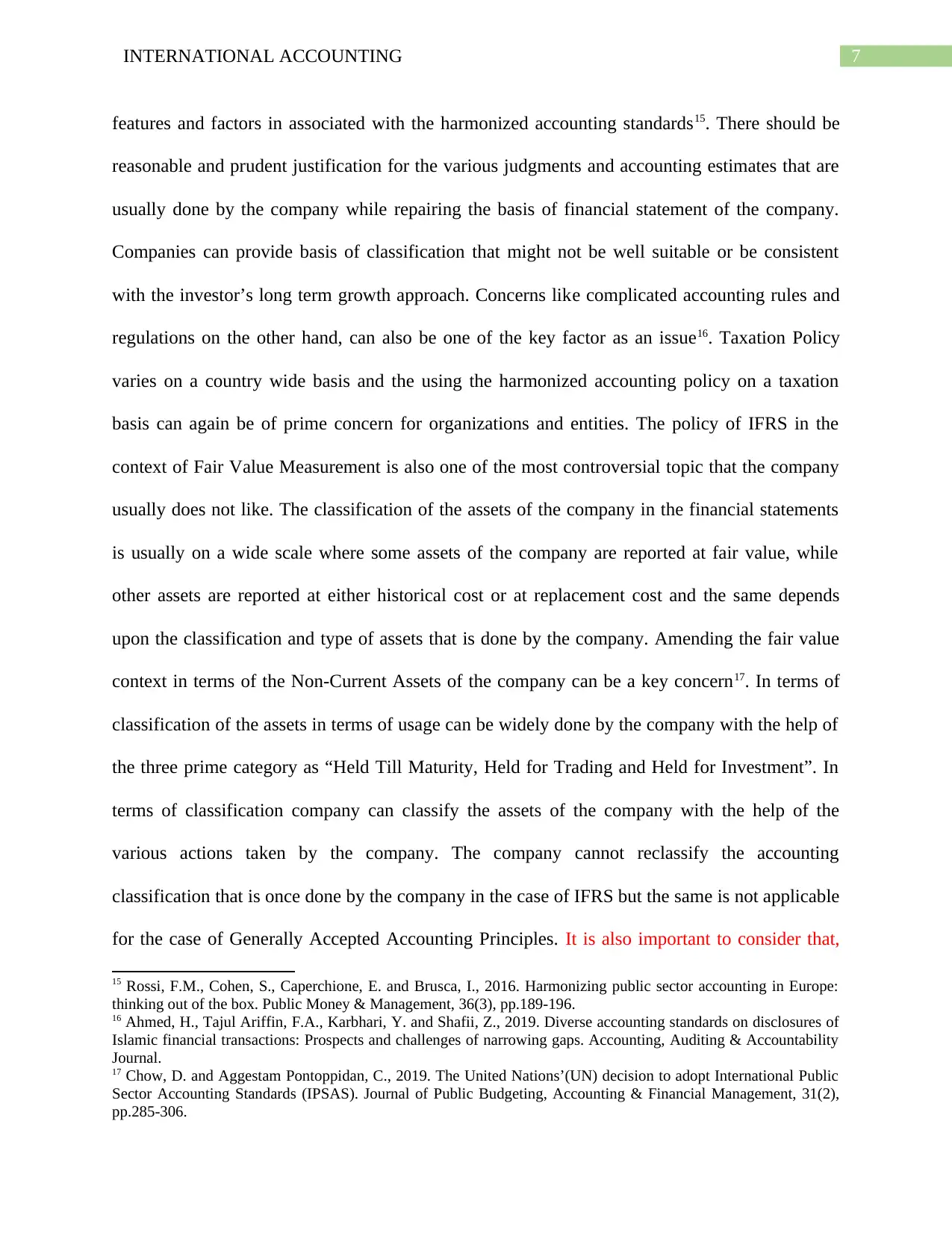
7INTERNATIONAL ACCOUNTING
features and factors in associated with the harmonized accounting standards15. There should be
reasonable and prudent justification for the various judgments and accounting estimates that are
usually done by the company while repairing the basis of financial statement of the company.
Companies can provide basis of classification that might not be well suitable or be consistent
with the investor’s long term growth approach. Concerns like complicated accounting rules and
regulations on the other hand, can also be one of the key factor as an issue16. Taxation Policy
varies on a country wide basis and the using the harmonized accounting policy on a taxation
basis can again be of prime concern for organizations and entities. The policy of IFRS in the
context of Fair Value Measurement is also one of the most controversial topic that the company
usually does not like. The classification of the assets of the company in the financial statements
is usually on a wide scale where some assets of the company are reported at fair value, while
other assets are reported at either historical cost or at replacement cost and the same depends
upon the classification and type of assets that is done by the company. Amending the fair value
context in terms of the Non-Current Assets of the company can be a key concern17. In terms of
classification of the assets in terms of usage can be widely done by the company with the help of
the three prime category as “Held Till Maturity, Held for Trading and Held for Investment”. In
terms of classification company can classify the assets of the company with the help of the
various actions taken by the company. The company cannot reclassify the accounting
classification that is once done by the company in the case of IFRS but the same is not applicable
for the case of Generally Accepted Accounting Principles. It is also important to consider that,
15 Rossi, F.M., Cohen, S., Caperchione, E. and Brusca, I., 2016. Harmonizing public sector accounting in Europe:
thinking out of the box. Public Money & Management, 36(3), pp.189-196.
16 Ahmed, H., Tajul Ariffin, F.A., Karbhari, Y. and Shafii, Z., 2019. Diverse accounting standards on disclosures of
Islamic financial transactions: Prospects and challenges of narrowing gaps. Accounting, Auditing & Accountability
Journal.
17 Chow, D. and Aggestam Pontoppidan, C., 2019. The United Nations’(UN) decision to adopt International Public
Sector Accounting Standards (IPSAS). Journal of Public Budgeting, Accounting & Financial Management, 31(2),
pp.285-306.
features and factors in associated with the harmonized accounting standards15. There should be
reasonable and prudent justification for the various judgments and accounting estimates that are
usually done by the company while repairing the basis of financial statement of the company.
Companies can provide basis of classification that might not be well suitable or be consistent
with the investor’s long term growth approach. Concerns like complicated accounting rules and
regulations on the other hand, can also be one of the key factor as an issue16. Taxation Policy
varies on a country wide basis and the using the harmonized accounting policy on a taxation
basis can again be of prime concern for organizations and entities. The policy of IFRS in the
context of Fair Value Measurement is also one of the most controversial topic that the company
usually does not like. The classification of the assets of the company in the financial statements
is usually on a wide scale where some assets of the company are reported at fair value, while
other assets are reported at either historical cost or at replacement cost and the same depends
upon the classification and type of assets that is done by the company. Amending the fair value
context in terms of the Non-Current Assets of the company can be a key concern17. In terms of
classification of the assets in terms of usage can be widely done by the company with the help of
the three prime category as “Held Till Maturity, Held for Trading and Held for Investment”. In
terms of classification company can classify the assets of the company with the help of the
various actions taken by the company. The company cannot reclassify the accounting
classification that is once done by the company in the case of IFRS but the same is not applicable
for the case of Generally Accepted Accounting Principles. It is also important to consider that,
15 Rossi, F.M., Cohen, S., Caperchione, E. and Brusca, I., 2016. Harmonizing public sector accounting in Europe:
thinking out of the box. Public Money & Management, 36(3), pp.189-196.
16 Ahmed, H., Tajul Ariffin, F.A., Karbhari, Y. and Shafii, Z., 2019. Diverse accounting standards on disclosures of
Islamic financial transactions: Prospects and challenges of narrowing gaps. Accounting, Auditing & Accountability
Journal.
17 Chow, D. and Aggestam Pontoppidan, C., 2019. The United Nations’(UN) decision to adopt International Public
Sector Accounting Standards (IPSAS). Journal of Public Budgeting, Accounting & Financial Management, 31(2),
pp.285-306.
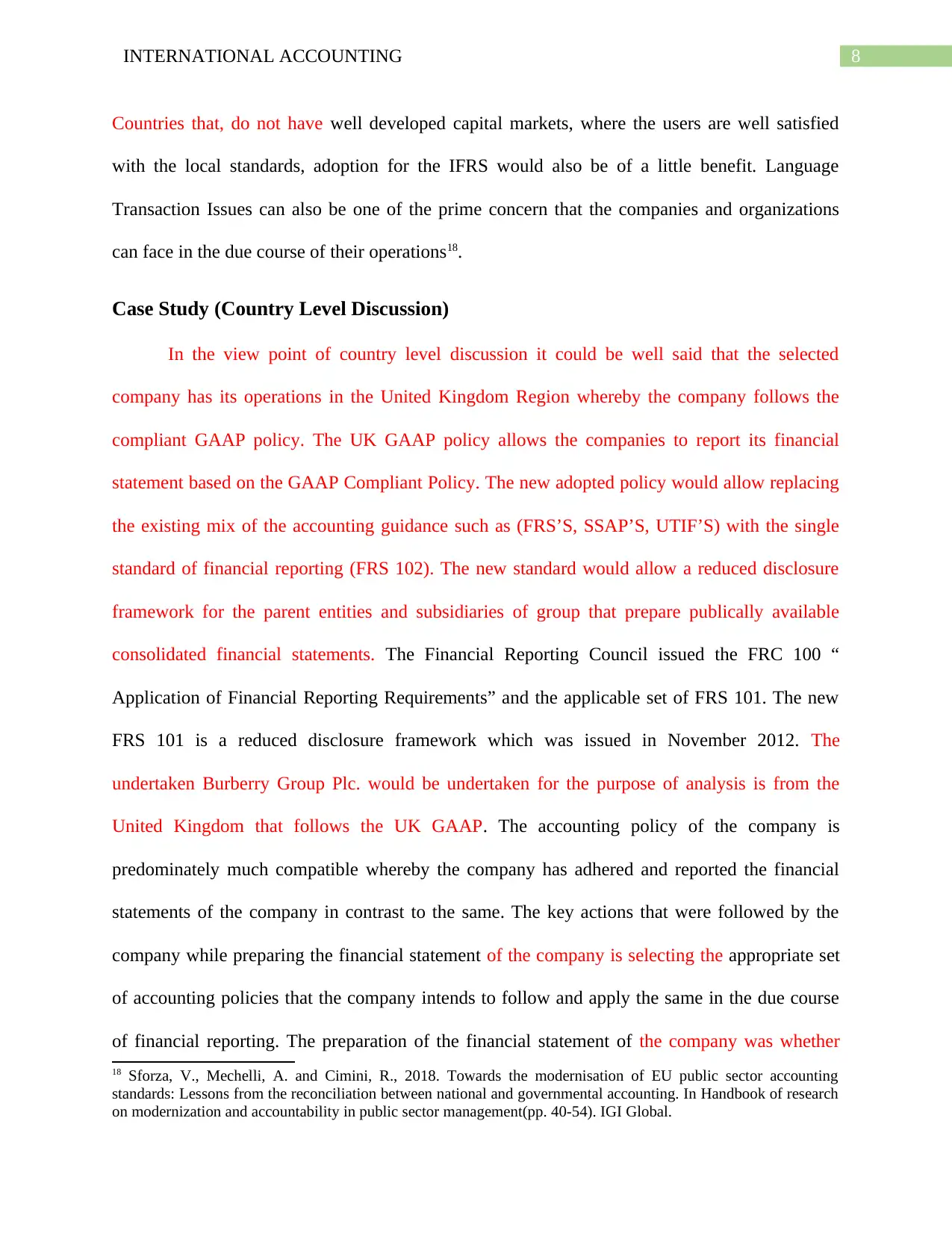
8INTERNATIONAL ACCOUNTING
Countries that, do not have well developed capital markets, where the users are well satisfied
with the local standards, adoption for the IFRS would also be of a little benefit. Language
Transaction Issues can also be one of the prime concern that the companies and organizations
can face in the due course of their operations18.
Case Study (Country Level Discussion)
In the view point of country level discussion it could be well said that the selected
company has its operations in the United Kingdom Region whereby the company follows the
compliant GAAP policy. The UK GAAP policy allows the companies to report its financial
statement based on the GAAP Compliant Policy. The new adopted policy would allow replacing
the existing mix of the accounting guidance such as (FRS’S, SSAP’S, UTIF’S) with the single
standard of financial reporting (FRS 102). The new standard would allow a reduced disclosure
framework for the parent entities and subsidiaries of group that prepare publically available
consolidated financial statements. The Financial Reporting Council issued the FRC 100 “
Application of Financial Reporting Requirements” and the applicable set of FRS 101. The new
FRS 101 is a reduced disclosure framework which was issued in November 2012. The
undertaken Burberry Group Plc. would be undertaken for the purpose of analysis is from the
United Kingdom that follows the UK GAAP. The accounting policy of the company is
predominately much compatible whereby the company has adhered and reported the financial
statements of the company in contrast to the same. The key actions that were followed by the
company while preparing the financial statement of the company is selecting the appropriate set
of accounting policies that the company intends to follow and apply the same in the due course
of financial reporting. The preparation of the financial statement of the company was whether
18 Sforza, V., Mechelli, A. and Cimini, R., 2018. Towards the modernisation of EU public sector accounting
standards: Lessons from the reconciliation between national and governmental accounting. In Handbook of research
on modernization and accountability in public sector management(pp. 40-54). IGI Global.
Countries that, do not have well developed capital markets, where the users are well satisfied
with the local standards, adoption for the IFRS would also be of a little benefit. Language
Transaction Issues can also be one of the prime concern that the companies and organizations
can face in the due course of their operations18.
Case Study (Country Level Discussion)
In the view point of country level discussion it could be well said that the selected
company has its operations in the United Kingdom Region whereby the company follows the
compliant GAAP policy. The UK GAAP policy allows the companies to report its financial
statement based on the GAAP Compliant Policy. The new adopted policy would allow replacing
the existing mix of the accounting guidance such as (FRS’S, SSAP’S, UTIF’S) with the single
standard of financial reporting (FRS 102). The new standard would allow a reduced disclosure
framework for the parent entities and subsidiaries of group that prepare publically available
consolidated financial statements. The Financial Reporting Council issued the FRC 100 “
Application of Financial Reporting Requirements” and the applicable set of FRS 101. The new
FRS 101 is a reduced disclosure framework which was issued in November 2012. The
undertaken Burberry Group Plc. would be undertaken for the purpose of analysis is from the
United Kingdom that follows the UK GAAP. The accounting policy of the company is
predominately much compatible whereby the company has adhered and reported the financial
statements of the company in contrast to the same. The key actions that were followed by the
company while preparing the financial statement of the company is selecting the appropriate set
of accounting policies that the company intends to follow and apply the same in the due course
of financial reporting. The preparation of the financial statement of the company was whether
18 Sforza, V., Mechelli, A. and Cimini, R., 2018. Towards the modernisation of EU public sector accounting
standards: Lessons from the reconciliation between national and governmental accounting. In Handbook of research
on modernization and accountability in public sector management(pp. 40-54). IGI Global.
⊘ This is a preview!⊘
Do you want full access?
Subscribe today to unlock all pages.

Trusted by 1+ million students worldwide
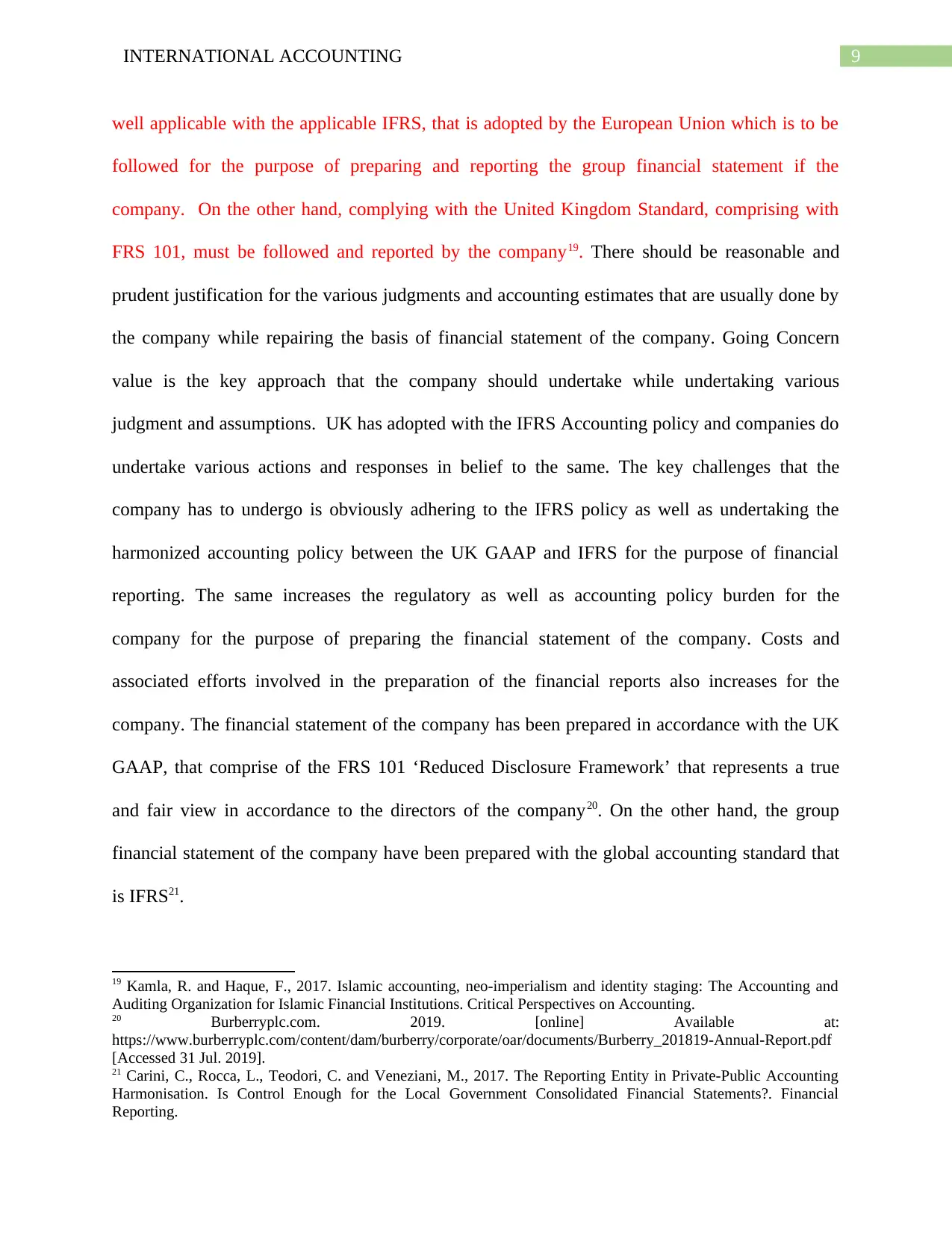
9INTERNATIONAL ACCOUNTING
well applicable with the applicable IFRS, that is adopted by the European Union which is to be
followed for the purpose of preparing and reporting the group financial statement if the
company. On the other hand, complying with the United Kingdom Standard, comprising with
FRS 101, must be followed and reported by the company19. There should be reasonable and
prudent justification for the various judgments and accounting estimates that are usually done by
the company while repairing the basis of financial statement of the company. Going Concern
value is the key approach that the company should undertake while undertaking various
judgment and assumptions. UK has adopted with the IFRS Accounting policy and companies do
undertake various actions and responses in belief to the same. The key challenges that the
company has to undergo is obviously adhering to the IFRS policy as well as undertaking the
harmonized accounting policy between the UK GAAP and IFRS for the purpose of financial
reporting. The same increases the regulatory as well as accounting policy burden for the
company for the purpose of preparing the financial statement of the company. Costs and
associated efforts involved in the preparation of the financial reports also increases for the
company. The financial statement of the company has been prepared in accordance with the UK
GAAP, that comprise of the FRS 101 ‘Reduced Disclosure Framework’ that represents a true
and fair view in accordance to the directors of the company20. On the other hand, the group
financial statement of the company have been prepared with the global accounting standard that
is IFRS21.
19 Kamla, R. and Haque, F., 2017. Islamic accounting, neo-imperialism and identity staging: The Accounting and
Auditing Organization for Islamic Financial Institutions. Critical Perspectives on Accounting.
20 Burberryplc.com. 2019. [online] Available at:
https://www.burberryplc.com/content/dam/burberry/corporate/oar/documents/Burberry_201819-Annual-Report.pdf
[Accessed 31 Jul. 2019].
21 Carini, C., Rocca, L., Teodori, C. and Veneziani, M., 2017. The Reporting Entity in Private-Public Accounting
Harmonisation. Is Control Enough for the Local Government Consolidated Financial Statements?. Financial
Reporting.
well applicable with the applicable IFRS, that is adopted by the European Union which is to be
followed for the purpose of preparing and reporting the group financial statement if the
company. On the other hand, complying with the United Kingdom Standard, comprising with
FRS 101, must be followed and reported by the company19. There should be reasonable and
prudent justification for the various judgments and accounting estimates that are usually done by
the company while repairing the basis of financial statement of the company. Going Concern
value is the key approach that the company should undertake while undertaking various
judgment and assumptions. UK has adopted with the IFRS Accounting policy and companies do
undertake various actions and responses in belief to the same. The key challenges that the
company has to undergo is obviously adhering to the IFRS policy as well as undertaking the
harmonized accounting policy between the UK GAAP and IFRS for the purpose of financial
reporting. The same increases the regulatory as well as accounting policy burden for the
company for the purpose of preparing the financial statement of the company. Costs and
associated efforts involved in the preparation of the financial reports also increases for the
company. The financial statement of the company has been prepared in accordance with the UK
GAAP, that comprise of the FRS 101 ‘Reduced Disclosure Framework’ that represents a true
and fair view in accordance to the directors of the company20. On the other hand, the group
financial statement of the company have been prepared with the global accounting standard that
is IFRS21.
19 Kamla, R. and Haque, F., 2017. Islamic accounting, neo-imperialism and identity staging: The Accounting and
Auditing Organization for Islamic Financial Institutions. Critical Perspectives on Accounting.
20 Burberryplc.com. 2019. [online] Available at:
https://www.burberryplc.com/content/dam/burberry/corporate/oar/documents/Burberry_201819-Annual-Report.pdf
[Accessed 31 Jul. 2019].
21 Carini, C., Rocca, L., Teodori, C. and Veneziani, M., 2017. The Reporting Entity in Private-Public Accounting
Harmonisation. Is Control Enough for the Local Government Consolidated Financial Statements?. Financial
Reporting.
Paraphrase This Document
Need a fresh take? Get an instant paraphrase of this document with our AI Paraphraser
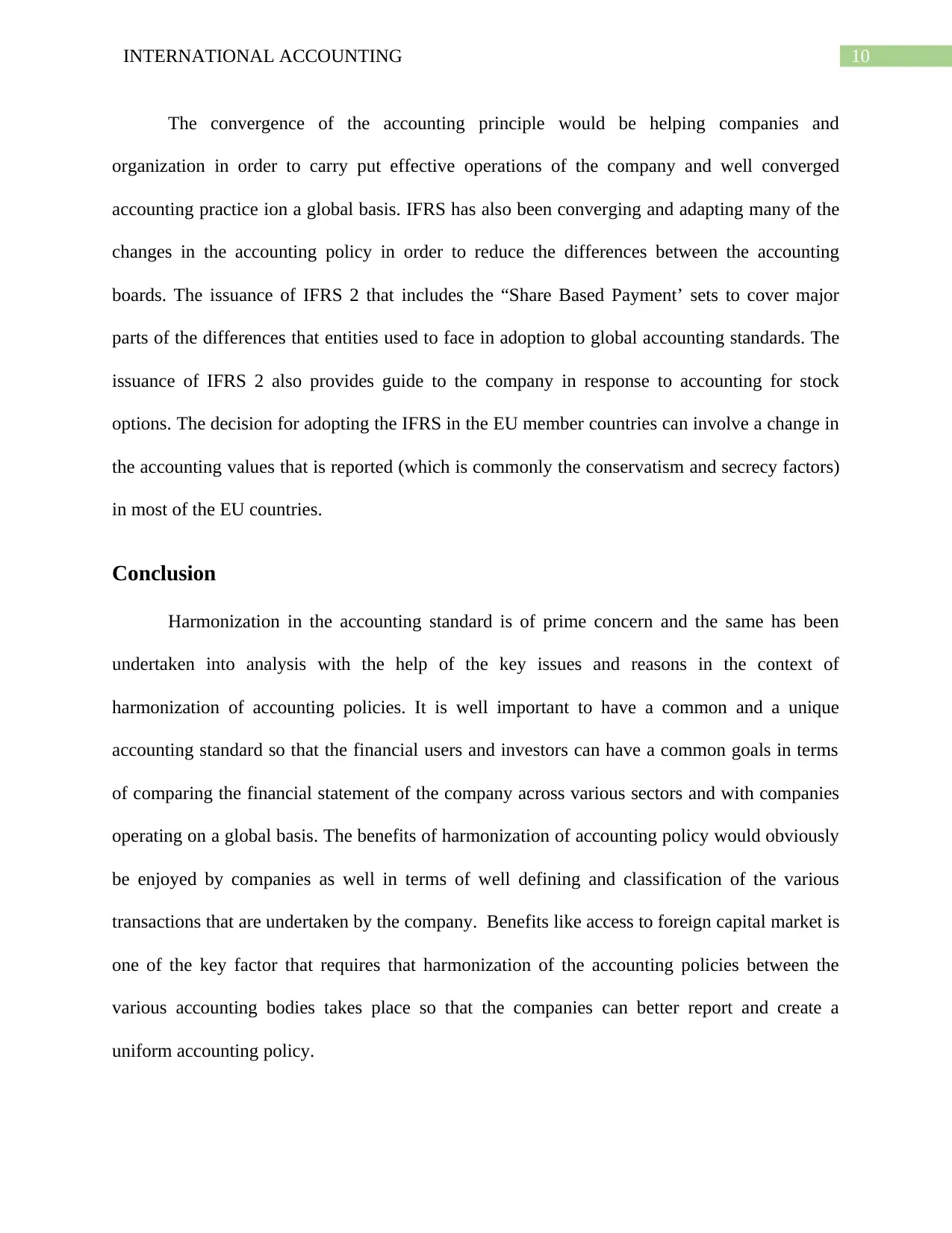
10INTERNATIONAL ACCOUNTING
The convergence of the accounting principle would be helping companies and
organization in order to carry put effective operations of the company and well converged
accounting practice ion a global basis. IFRS has also been converging and adapting many of the
changes in the accounting policy in order to reduce the differences between the accounting
boards. The issuance of IFRS 2 that includes the “Share Based Payment’ sets to cover major
parts of the differences that entities used to face in adoption to global accounting standards. The
issuance of IFRS 2 also provides guide to the company in response to accounting for stock
options. The decision for adopting the IFRS in the EU member countries can involve a change in
the accounting values that is reported (which is commonly the conservatism and secrecy factors)
in most of the EU countries.
Conclusion
Harmonization in the accounting standard is of prime concern and the same has been
undertaken into analysis with the help of the key issues and reasons in the context of
harmonization of accounting policies. It is well important to have a common and a unique
accounting standard so that the financial users and investors can have a common goals in terms
of comparing the financial statement of the company across various sectors and with companies
operating on a global basis. The benefits of harmonization of accounting policy would obviously
be enjoyed by companies as well in terms of well defining and classification of the various
transactions that are undertaken by the company. Benefits like access to foreign capital market is
one of the key factor that requires that harmonization of the accounting policies between the
various accounting bodies takes place so that the companies can better report and create a
uniform accounting policy.
The convergence of the accounting principle would be helping companies and
organization in order to carry put effective operations of the company and well converged
accounting practice ion a global basis. IFRS has also been converging and adapting many of the
changes in the accounting policy in order to reduce the differences between the accounting
boards. The issuance of IFRS 2 that includes the “Share Based Payment’ sets to cover major
parts of the differences that entities used to face in adoption to global accounting standards. The
issuance of IFRS 2 also provides guide to the company in response to accounting for stock
options. The decision for adopting the IFRS in the EU member countries can involve a change in
the accounting values that is reported (which is commonly the conservatism and secrecy factors)
in most of the EU countries.
Conclusion
Harmonization in the accounting standard is of prime concern and the same has been
undertaken into analysis with the help of the key issues and reasons in the context of
harmonization of accounting policies. It is well important to have a common and a unique
accounting standard so that the financial users and investors can have a common goals in terms
of comparing the financial statement of the company across various sectors and with companies
operating on a global basis. The benefits of harmonization of accounting policy would obviously
be enjoyed by companies as well in terms of well defining and classification of the various
transactions that are undertaken by the company. Benefits like access to foreign capital market is
one of the key factor that requires that harmonization of the accounting policies between the
various accounting bodies takes place so that the companies can better report and create a
uniform accounting policy.
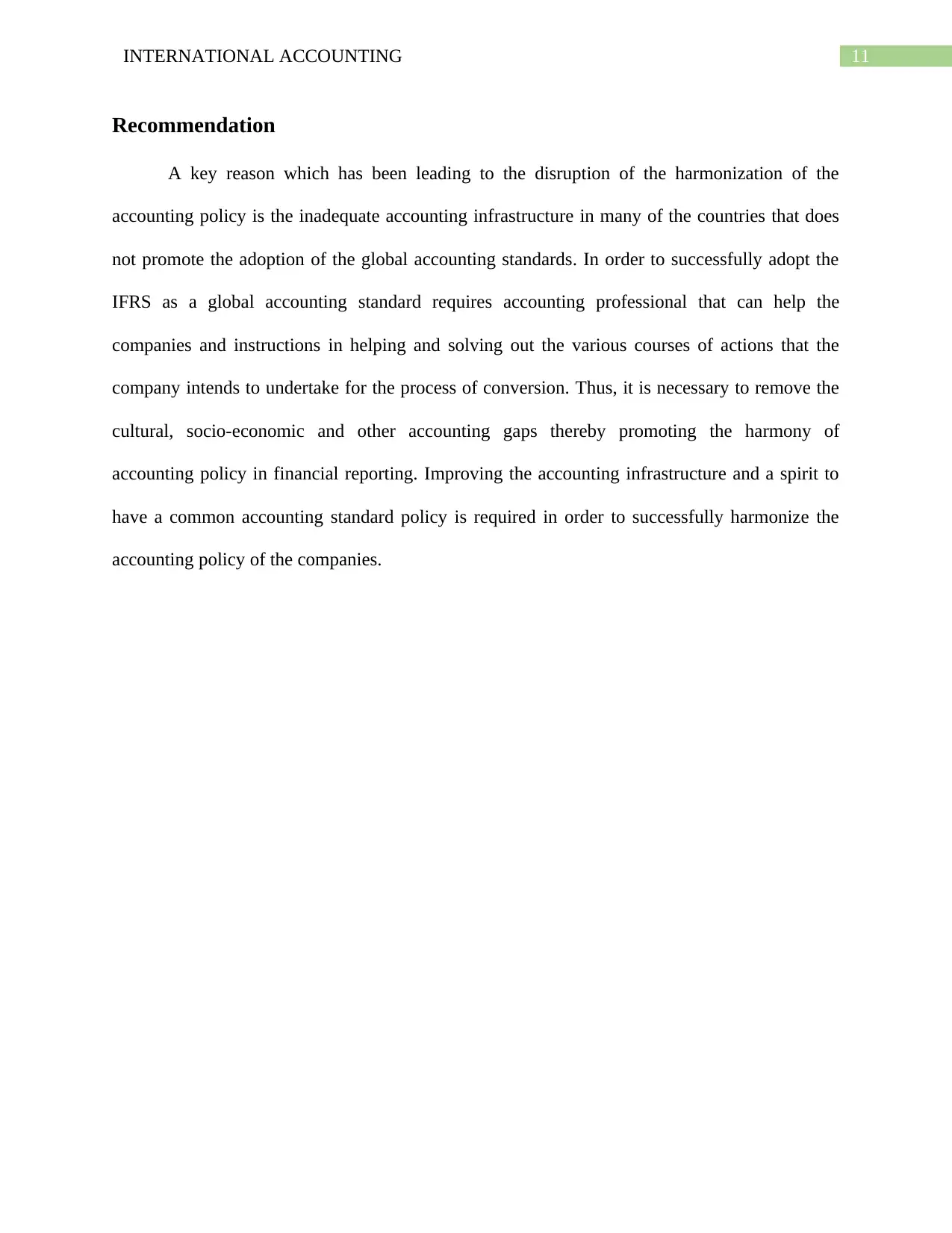
11INTERNATIONAL ACCOUNTING
Recommendation
A key reason which has been leading to the disruption of the harmonization of the
accounting policy is the inadequate accounting infrastructure in many of the countries that does
not promote the adoption of the global accounting standards. In order to successfully adopt the
IFRS as a global accounting standard requires accounting professional that can help the
companies and instructions in helping and solving out the various courses of actions that the
company intends to undertake for the process of conversion. Thus, it is necessary to remove the
cultural, socio-economic and other accounting gaps thereby promoting the harmony of
accounting policy in financial reporting. Improving the accounting infrastructure and a spirit to
have a common accounting standard policy is required in order to successfully harmonize the
accounting policy of the companies.
Recommendation
A key reason which has been leading to the disruption of the harmonization of the
accounting policy is the inadequate accounting infrastructure in many of the countries that does
not promote the adoption of the global accounting standards. In order to successfully adopt the
IFRS as a global accounting standard requires accounting professional that can help the
companies and instructions in helping and solving out the various courses of actions that the
company intends to undertake for the process of conversion. Thus, it is necessary to remove the
cultural, socio-economic and other accounting gaps thereby promoting the harmony of
accounting policy in financial reporting. Improving the accounting infrastructure and a spirit to
have a common accounting standard policy is required in order to successfully harmonize the
accounting policy of the companies.
⊘ This is a preview!⊘
Do you want full access?
Subscribe today to unlock all pages.

Trusted by 1+ million students worldwide
1 out of 15
Related Documents
Your All-in-One AI-Powered Toolkit for Academic Success.
+13062052269
info@desklib.com
Available 24*7 on WhatsApp / Email
![[object Object]](/_next/static/media/star-bottom.7253800d.svg)
Unlock your academic potential
Copyright © 2020–2026 A2Z Services. All Rights Reserved. Developed and managed by ZUCOL.





